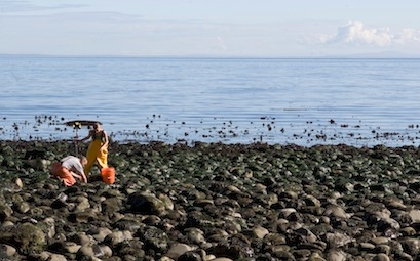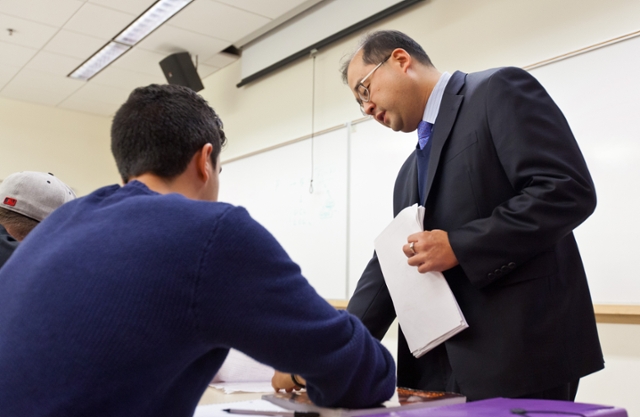Page 16 • (256 results in 0.017 seconds)
-
The Knight Campus Graduate Internship Program at the University of Oregon provides an opportunity to complete a master’s degree and a 9 month paid internship in science or engineering – in as little as 15 months. Learn More: Virtual Alumni Panel – THIS THURSDAY! Thursday, December 2nd 4-5PM Pacific / 7-8PM Eastern RSVP for Zoom info: …
. Regardless of which trail you eventually blaze, this program allows you to do it with more data about the opportunities out there. Application Fee is Waived for Domestic Students for 2022! (citizens and green-card holders) Read Previous Clean Energy Bridge to Research (CEBR) Read Next Paid Science and Engineering Summer Research Opportunities at Rice University LATEST POSTS Dept of Energy Computational Science Graduate Fellowship October 30, 2024 Allen Institute Summer Internship Program October 29, 2024
-

TACOMA, WASH. (Oct. 31, 2019) — When most people hear the words “Master of Science in Marketing Analytics,” they don’t immediately think of the marketing challenges facing a craft liquor distillery. Yet those challenges have been top-of-mind for Pacific Lutheran University MSMA students Matthew Dixon…
project. “Our pairing up on the project was not an accident,” Dixon says. “My background is in mathematics and Inge’s is in marketing, so we could teach each other a lot. We both worked on everything, but on the data analysis side, when it got really quantitative, I’d show her what I was doing. Whereas, when it came to the marketing side and coming up with the creative ideas, she’d be showing me the ropes.” The MSMA’s focus on real-world experience is perhaps its most unique strength, Dixon says
-

Daniel Hachet ‘20 might be graduating this spring, but his green initiatives will continue on at PLU. On-campus restaurants now recycle thousands of cereal bags—and are even getting paid to do so. Residence Halls now offer recycling during summer camps. Reusable dishes and compostable straws…
disciplines can go together, with data analysis as the linking piece,” Hachet says. During this time of COVID-19 and shelter-in-place, Hachet is staying at a friend’s house off-campus. He hopes to remain in Washington after graduation. “I go on hikes all the time, and everyone here is really friendly,” he says. He hopes to land a position as an Americorps sustainability coordinator right after graduation. Eventually, he’d like to work in data analysis for environmental consulting firms. Hachet will miss
-

“Capturing astronomy images is rewarding but can be challenging,” said professor of physics Katrina Hay. “It requires long exposures or stacked images, focusing in cold dark conditions, climbing a ladder to access the telescope, tracking objects as they move across the sky, and merging several…
share their summer research from the W. M. Keck Observatory Julian Kop ’24 classifies variable star systems, data processing and modeling. “Astronomy and Astrophysics have been my childhood and career interest since I was an elementary student, and engaging in undergraduate astronomy research kept me motivated and inspired throughout this entire summer,” reflected senior physics major Julian Kop. Two star systems, RR Lyrae and 68 Herculis, exhibit remarkable fluctuations in brightness, rendering
-
The University of Washington Molecular Engineering Materials Center (UW MEM·C) summer REU program is focused on exposing underrepresented minorities and veterans to a viable and relevant career pathway focused on materials and energy research. OUR FOCUS: MATERIALS RESILIENCE AND INNOVATION Undergraduates, including veterans, will find…
a graduate student and faculty to develop a research project, gain training in relevant techniques and instrumentation, collect data, and finally produce a poster and research abstract. Students participate in a weekly seminar on undergraduate research covering research ethics, writing a research abstract, making a scientific poster. Students participate in a weekly Materials Science special interest group in which they read scientific journals or tour other labs. Duration: 9 weeks Dates: June
-
Research in Interdisciplinary STEM Education (RISE) is a 9-week residential summer research experience for undergraduate students in chemistry, education, life sciences, mathematics, or physics. Participants will join interdisciplinary teams mentored by faculty to investigate STEM learning across formal and informal environments with a focus on understanding issues related…
-solving in class. As each student cohort progresses from the preparatory chemistry course on to general chemistry, we are accumulating data to determine the effectiveness of the course in supporting students’ future success in general chemistry and beyond. Through this project, RISE researchers will develop skills in basic statistical analysis as well as best practices for teaching in undergraduate classes. Faculty mentors: Drs. Buckley, Lessman, and Mixter Read Previous REU opportunity at Georgia
-

Pacific Lutheran University leaders recently announced two new natural sciences programs. Officially launching in fall 2022, students will be able to pursue a major in applied mathematics and/or a minor in engineering and industry. The applied mathematics major builds upon the existing mathematics courses, incorporates…
computer science, physics, and chemistry, as well as with an economics or data science minor. The applied mathematics major is offered in alongside the Bachelor of Science in Mathematics, Bachelor of Arts in Mathematics and the Bachelor of Science in Mathematics Education. The engineering and industry minor will take advantage of courses already offered by the university’s physics department to students in the Dual-Degree Engineering Program. In addition to math and science courses, students will
-

A summer job that doesn’t suck By Steve Hansen Of all the potentially tedious summer jobs, here’s a new one: spending hours on your knees, rolling over one boulder after another, just to see what’s underneath. For Stephanie Agoncillo ’08 and Melissa Youngquist ’09, this…
. In the natural sciences alone, each summer, more than nine faculty members worked with more than 21 students to conduct fieldwork, as well as gather and analyze data. And the number of projects keep on growing. The trio was part of nine student-faculty summer research projects in the natural sciences, many of which conducted fieldwork in the nearby forests, mountains and coastal areas of the Pacific Northwest. It is why they are here, just a couple hours away from the PLU campus, ankle-deep in
-

Assistant Professor Brian Maeng works with a student in class. Maeng teaches Operations Management and Management Information Systems at Pacific Lutheran University. (Photo by John Froschauer) PLU’s School of Business ranked as one of the best in the U.S. Pacific Lutheran University’s School of Business…
Business Schools. The Review also ranked PLU’s business school as one of the Best in the West. “We recommend Pacific Lutheran University as one of the best institutions a student could attend to earn a business school degree,” said Robert Frank, Princeton Review senior vice president of publications. “We chose the schools we profile in this book based on our high regard for their academic programs and our reviews of institutional data we collect from the schools.” The Princeton Review’s survey asks
-
The University of Washington Molecular Engineering Materials Center (UW MEM·C) summer REU program is focused on exposing underrepresented minorities and veterans to a viable and relevant career pathway focused on materials and energy research. OUR FOCUS: MATERIALS RESILIENCE AND INNOVATION Undergraduates, including veterans, will find…
a graduate student and faculty to develop a research project, gain training in relevant techniques and instrumentation, collect data, and finally produce a poster and research abstract. Students participate in a weekly seminar on undergraduate research covering research ethics, writing a research abstract, making a scientific poster. Students participate in a weekly Materials Science special interest group in which they read scientific journals or tour other labs. Duration: 9 weeks Dates: June
Do you have any feedback for us? If so, feel free to use our Feedback Form.


